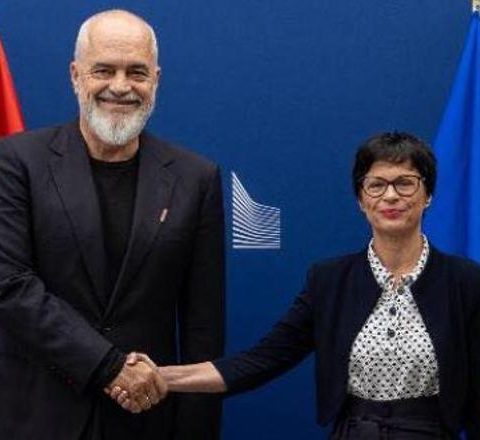Tirana mayor takes over as new opposition leader, following first one-member-one-vote election in party’s history
TIRANA, July 23 – Tirana Mayor Lulzim Basha will serve as head of the Albanian opposition, after he won an internal election Tuesday to become the next leader of the Albania’s Democratic Party.
Basha has been elected as party chief in the first internal election of its kind in the Democratic Party, under the one-member-one-vote principle.
Democratic Party officials in charge of the election said Basha won 80 percent of the votes, and about 41,000 members voted from about the total of about 105,000 Democratic Party card-carrying members.
“The tasks ahead of us are not easy. The challenges are great. But we have always shown determination,” Basha said in his victory speech, referring to one of the worst showing in the party’s history in the general elections last month, which sent it back to opposition status.
Sokol Olldashi, a veteran member of parliament and cabinet minister, was Basha’s rival for the seat. He expressed deep doubts about how the election was held, indicating the candidates were not treated equally and the results had been distorted by problems with the voter lists and pressure on members.
But Olldashi added he would stay within the party to meet future challenges, squashing earlier fears of a possible split in the Democratic Party of those unhappy with the results.
“I want my position to be clear. The election result has been distorted. We did not have clear access to the lists [of voting members] and it was not made available to me,” Olldashi said.
Basha, takes over from outgoing Prime Minister Sali Berisha, who has dominated the party for more than two decades. Berisha resigned after the Democrats lost the July 23 national election in a landslide, leading to an internal party election open to all its members to select the next party leader.
Basha, 39, is a lawyer educated in the Netherlands who worked for the UN in Kosovo before returning to Albania ahead of the 2005 elections to join the Democratic Party. He has held important cabinet posts during the previous eight years, including heading the foreign and interior ministries.
He was elected Tirana mayor in 2011 by narrowly defeating incoming Prime Minister Edi Rama, in a hotly disputed process, which Rama has said was rigged.
Many commentators see Basha as Berisha’s hand-picked successor, and the outgoing prime minister congratulated the new leader at a press conference at party headquarters, referring to Basha as a “success story.”
“He has successfully fulfilled every task that he has had. His election as Democratic Party leader is an excellent start for a new beginning,” Berisha said.
Berisha has ruled the Democratic Party with an iron fist for more than two decades, and there have been few challengers to his rule. But the election also marks the first time in the party’s history that rank-and-file members vote directly for their chairman.
Berisha resigned as party boss following the defeat in the June 23 parliamentary elections, won by a landslide by the Socialists headed by former Tirana mayor Rama.
During the campaign, both candidates for the party leadership have avoided criticizing Berisha. Instead both of them targeted the leftist Socialist Party-led coalition and its leader, Rama, expected to be next prime minister in September.
Olldashi had earlier stated he was not being given a fair race. He said to the list of the party membership was not done properly the ballots were entirely secret as they contained serial numbers. Olldashi accused the party leadership, though not Berisha by name, that there have been many efforts to support Basha while his own supporters had been punished. He also said that many newcomers had voted and hoped they would really remain party members.
Olldashi faced some criticism for holding his news conference at the Transport Ministry, which he still heads until September, rather than the party headquarters.
Commentators say much will be decided by how much of a role, if any, Berisha decides to play behind the scenes following his resignation. The outgoing prime minister has controlled the party since its inception in 1991 and still has a following among staunch supporters.










